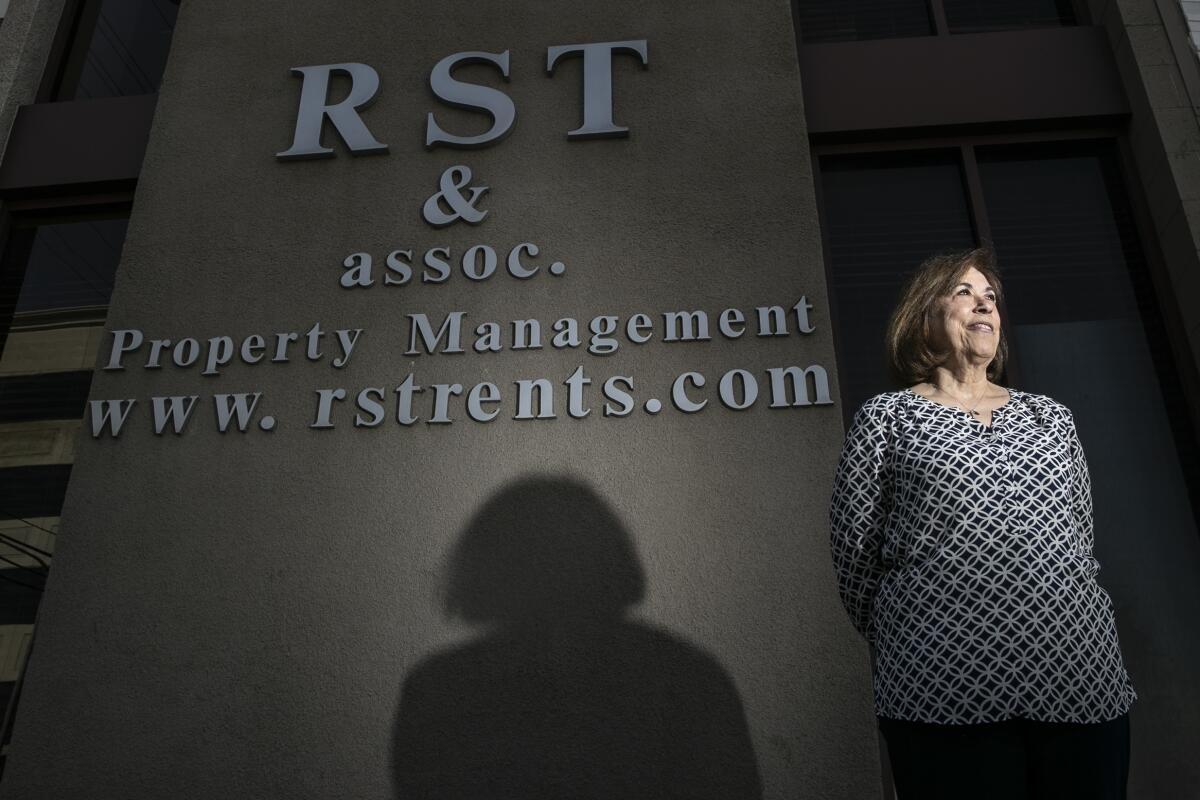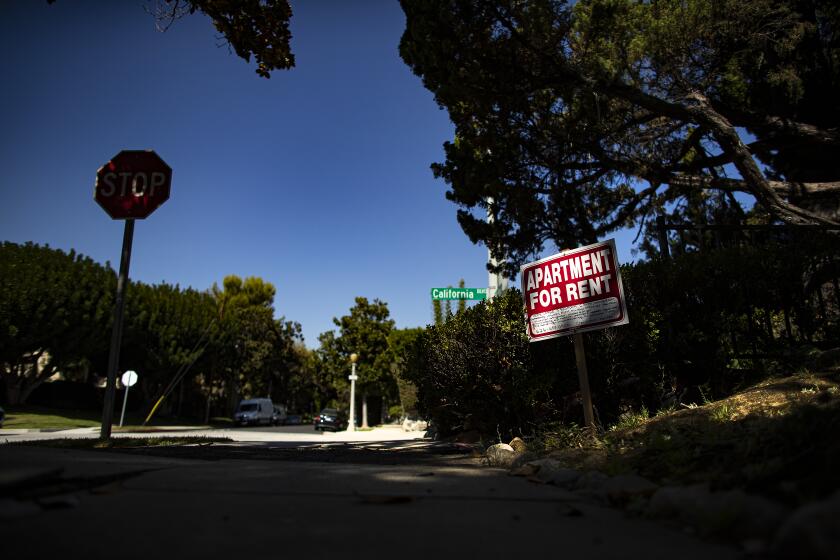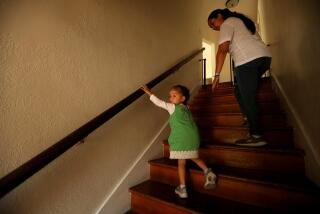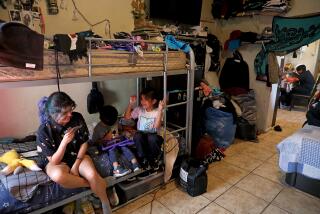Landlords are waiting for rent payments — and some can’t hold on much longer

- Share via
As COVID-19 took root and jobs vanished, officials sought to avoid a wave of evictions, homelessness and the spread of deadly disease that could result. Governments from federal to local enacted rules allowing people whose finances have been affected by the pandemic to keep their housing if they don’t pay rent.
The policies have been a lifesaver for many during a crisis when staying home meant staying healthy, but a year later landlords say the rules are heaping an increasingly unfair burden on them.
In interviews with The Times, property owners and managers said they understood the unprecedented nature of the crisis but that they are absorbing too much of the cost. Many said they or their clients are dipping into savings to keep properties afloat and delaying maintenance or repairs because they can’t afford them.
Some said they probably can’t or won’t hold on much longer under these circumstances.
“I am hoping something will turn around [so] I don’t have to sell,” said Beverly Rowe, who manages her family’s Los Angeles triplex, an asset she is proud to have secured to ensure her parents’ financial security in old age and to pass down wealth.
That asset, hard-earned for many Black households like hers, is now at risk. Rowe said a tenant owes $30,000 in rent payments missed over the last year.
Billions of dollars in federal rent relief for both landlords and tenants have finally started to flow in recent weeks, but it’s unclear how far the money will go.
The pandemic’s worst effects have been felt most by those who earn less — a demographic more likely to be renters, as well as people of color. Its jolt to livelihoods has been clear in data on lost jobs and the millions of Americans newly receiving food aid, among other indicators. Researchers have also documented well the rising debts that tenants owe their landlords — missed rent must eventually be paid back — and the long-term financial consequences for those renters.
The picture has been less clear on the other end of the housing equation: how property owners who depend on rent for income have fared as their tenants face financial hardship. Opaque ownership structures can make it difficult to know just who owns what property, for example, and some landlords are hesitant to talk openly about tenants or their own financial positions.
Several landlords interviewed by The Times asked not to be named, saying they feared that their comments would upset their tenants or the local authorities passing and enforcing tenant protections.
One property owner in her 60s said she is considering taking a second job to avoid having to sell her two 20-unit buildings because she’s having difficulty keeping up with mortgage payments. An owner in his 80s said he’s already told his lender he can no longer meet payments and anticipates handing the 200 units he owns back to the bank.
A new survey published Monday by researchers from the University of Pennsylvania offers more specific insight into the pandemic’s effect on landlords in Los Angeles: More than half of 1,300 property owners surveyed in December last year said their business would face financial distress within six months if their situations didn’t improve.
The poll found that, compared with before the pandemic, more owners are facing delinquent rent payments and problems filling vacancies. That, in turn, has challenged their ability to pay their mortgage, property taxes and the costs of building upkeep.
Millions of Americans, especially low-income tenants, are accumulating debt amid the COVID-19 pandemic, threatening to create a downward financial spiral.
The survey results show the ripple effect that missed payments from tenants can have on landlords’ ability to maintain their properties — and in some cases, their main source of income.
“There clearly is a lot of challenges being faced by property owners,” said Vincent Reina, the survey’s coauthor. The research is part of a collaboration between the Housing Initiative at Penn and six cities to analyze how local governments are responding to housing challenges brought on by the pandemic.
The poll left the definition of financial distress open but listed some examples: needing to sell assets, reduce services or lay off staff or being unable to pay mortgages or property taxes. In December, nearly 29% of those surveyed said they would reach that level of financial distress in less than three months.
Landlords are not a monolith: There are Wall Street firms that own tens of thousands of homes; secretive limited liability companies that pool investments from wealthy individuals; and the mom-and-pop landlords who own a few units and manage them as a full- or part-time job.
A study from the progressive think tank Institute for Policy Studies and other left-leaning groups found that 61 “billionaire landlords” with very large portfolios have seen their wealth collectively increase $24.4 billion during the pandemic — a far cry from the hardship reported by smaller owners in the L.A. survey.
L.A. property owners with five or fewer units were most likely, at 37%, to report an expectation of financial distress before three months. Owners with 30 or more units were least likely to expect financial distress before three months, but the percentage was still 20.3%.
The survey results could overstate the financial burden on landlords. The poll didn’t survey landlords broadly, rather only those with at least one tenant who had applied to an L.A. city rental assistance program launched early in the pandemic that contained far less money than recent efforts.
Still, Reina said that many distressed tenants probably did not apply for relief — meaning the survey may have left out many struggling landlords — and that the sample of 1,300 property owners represents a significant share of the city’s housing stock.
Some landlords and management companies said they suspect some of their nonpaying tenants aren’t facing financial difficulties, yet are still taking advantage of pandemic allowances. State law, for example, protects tenants from eviction for nonpayment if they sign a declaration under penalty of perjury that COVID-19 has affected them financially.
Landlords said that bar is very low, though they can request proof if they have evidence someone is high-income.
Dan Yukelson, executive director of the Apartment Assn. of Greater Los Angeles, which represents more than 10,000 landlords across Southern California, said there doesn’t appear to be wide-scale misrepresentation by tenants, but the approach still left open the door to abuse.
“There should have been some kind of means testing going on,” he said. “The majority of owners and tenants are honest, but there are some [tenants] who have taken advantage.”
Yukelson said any missed rent is a hit to association members, who have also faced added costs over the last year including rising water bills and requests for repairs as homes became offices, classrooms and all-around sanctuaries during the pandemic.
Larry Gross, executive director of the tenant rights group Coalition for Economic Survival, said he hasn’t come across tenants gaming the system. He said the tenants his organization works with are suffering and would pay rent if they could, because they know eviction protections will expire and understand the consequences for them of accumulating rent debt.
Gross said small landlords, in particular, should get more relief. But he said current eviction restrictions should not be rolled back: Tenants already are falling through the cracks and being forced out.
And red tape in the form of income verifications would make more people homeless than the small number of individuals who might be taking advantage. At particular risk are undocumented individuals who may be paid in cash at their jobs and could find it difficult to prove income loss.
“Given the housing and homeless crisis, we need it to be as easy as possible for people to be able to stay in their homes,” he said.
Falling behind
Though surveys show the vast majority of tenants are paying, a significant number are behind.
Moody’s Analytics and the Urban Institute think tank estimate 9.4 million U.S. renter households owed an average of $5,586 in back rent, utilities and related late fees as of January, for a total debt pile of $52.6 billion.
For landlords, the effect on their businesses depends on several factors, including whether they have a mortgage and the amount of reserves they’ve set aside to handle unexpected expenses at their properties.
Irma Vargas, the chief financial officer at property management firm RST & Associates, said that of the company’s clients, those with one to four units have been the hardest-hit.
The firm’s clients on average have nine to 12 units, and those owners should be able to hang on to their properties even though more are turning to savings to pay the property tax, Vargas said.
About 7% of the 3,200 units that RST manages in L.A. County have a tenant who is behind, she said.
If an owner with just a handful of units happens to have a nonpaying tenant, that’s a bigger bite out of revenue than it is for someone with dozens of units — a category of property owner that was also better off before the pandemic, the University of Pennsylvania survey showed.
Before March 2020, 4% of owners with more than 30 units reported problems with paying the mortgage, compared with 7.3% of owners with six to 30 units and 10% of owners with five or fewer units.
Vargas said two of her clients who own a few units each had to sell their respective properties recently because they couldn’t afford to keep them. “The little small mom-and-pops are getting burned on this one,” she said.
Los Angeles opened applications for its rent-relief program, which aims to help tenants and landlords with debt stemming from the COVID-19 pandemic.
National delinquency rates spotlight the differences among property owners of different sizes.
According to the Mortgage Bankers Assn., delinquency rates for all multifamily loan balances — a figure that will be skewed toward larger properties — was 1.8% last month, lower than other commercial loans for hotel, retail and office properties.
Meanwhile, about 9% of loans for properties with two to four units were delinquent in October, several percentage points higher than the rate for single-family homes, according to data firm Black Knight.
If small property owners go under, the implications for them and their tenants could be wide-ranging.
Many small owners say they bought their units for rental income in retirement after years of saving, and their later years could grow more difficult if their main income is upended.
Their inability to hold on to their properties also raises the prospect of a scenario that housing activists have feared from the pandemic’s earliest days: that large corporations and investment funds more likely to raise rent will scoop up distressed housing en masse, similar to how Wall Street firms acquired tens of thousands of single-family homes in the wake of the 2008 financial crisis.
That doesn’t appear to be happening, but the stress is building. Nearly 31% of landlords nationwide said they felt increased pressure to sell during the pandemic, according to an October survey by real estate firm Avail.
Generational blow
For some, losing business properties risks a backslide from the economic mobility that getting into the housing market once promised — a particularly painful development for Black Americans whom the government once barred from access to homeownership.
“We are going to have to sell,” Rowe said. “That means we cannot pass this property down.... There will be no generational wealth to continue in our family.”
After moving in with her 85-year-old mother to help care for her, Rowe worried about bringing COVID-19 home and stopped working her usual job as a physician assistant. She said she has burned through savings to cover the mortgage and repairs at the Mid-City triplex after the tenant stopped paying rent there.
With cash tight and no income from the property, Rowe said she is scrambling to pay for the supportive care her mother needs after a heart attack. Offloading the triplex looks increasingly necessary. “It’s devastating,” she said.
Even some landlords with less immediate financial pressures are taking a hit.
Jef Vander Borght, 69, owns two fourplexes in Burbank and Glendale with his wife that they bought roughly 20 years ago to help them through retirement.
Vander Borght, a retired architect and former Burbank mayor, said his tenants had fallen more than $12,000 behind in rent since last spring. He understands they have lost work and can’t pay in full, and doesn’t want to evict them.
He criticized governments as failing to adequately help struggling residents and in turn landlords like himself, citing a tenant of his who got help from a county program for the first time last month.
The local aid reduced the debt he is owed to around $7,000.
“I never, ever imagined we would be in a position just to be told to house people for free and ‘good luck getting help — help will eventually appear,’” he said.
An improving economy and the flow of significant rent relief money could improve fortunes for both landlords and tenants in coming months. The two federal stimulus bills passed since December allocate about $50 billion to help tenants nationwide pay rent, with that money set to automatically go to landlords.
A lot rests on the relief being enough and doled out properly.
The city of Los Angeles last week opened applications to its $235.5-million rent relief program, funded through the federal stimulus. Officials don’t think the money will be enough to help everyone in need and are picking applications at random.
Some landlords are already heading toward the exits, and not just those who are in immediate financial jeopardy.
David Haas, managing broker with Ernst and Haas Management Co., said he has clients selling preemptively. The Long Beach firm specializes in managing one- to four-unit properties for mom-and-pop owners.
They are “liquidating because of the fear of the laws that are protecting only tenants,” Haas said, “fear that their tenant could go into default and they won’t be able to do anything.”
More to Read
Inside the business of entertainment
The Wide Shot brings you news, analysis and insights on everything from streaming wars to production — and what it all means for the future.
You may occasionally receive promotional content from the Los Angeles Times.












